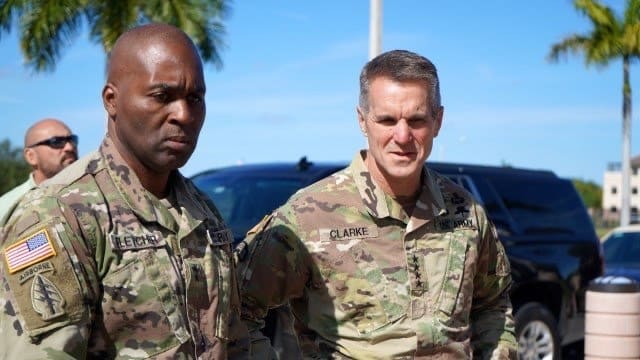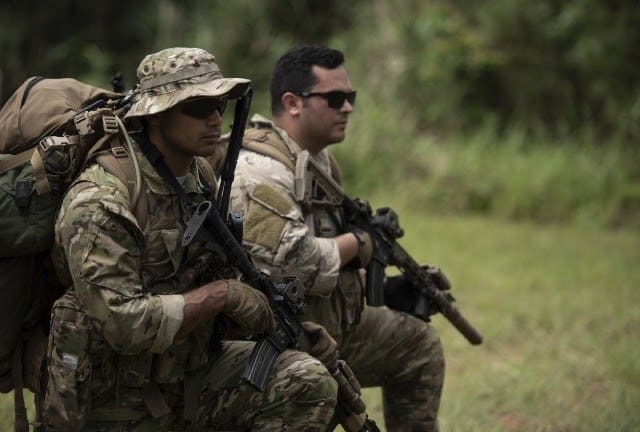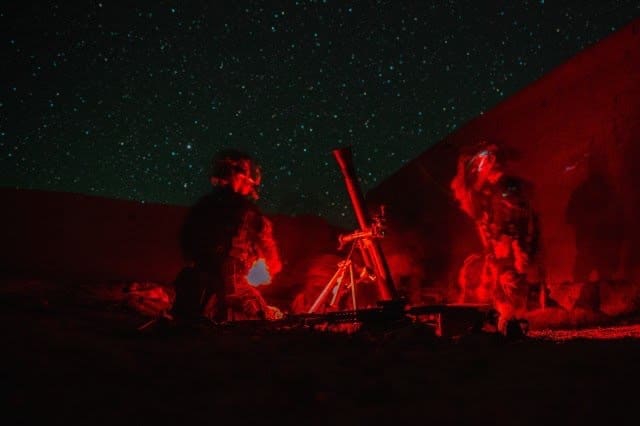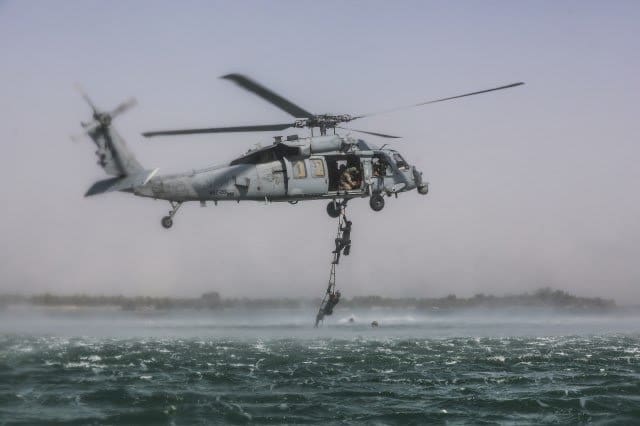WASHINGTON — U.S. special operations forces have no “systemic” failures of ethics, but a review points to the need for strengthening leadership at all levels, the commander of U.S. Special Operations Command said.

Army Gen. Richard D. Clarke told reporters at the Pentagon Tuesday that he ordered the comprehensive review of special operations culture after several instances of misconduct and unethical behavior threatened public trust and caused leaders to question special operations forces’ culture and ethics.
The review team looked at all aspects of the force and interviewed thousands of individuals, the general said.
Clarke said the review showed the vast majority of special operators maintain the highest standards of conduct every day, and they do so in some of the most challenging conditions around the globe.

However, he added, the review team did find that some aspects of the special operations culture did, at times, set conditions favorable for inappropriate behavior.
“We have a ‘can do’ culture with a bias toward action,” he said. “This culture is part of what makes us great. Nearly 20 years of continuous conflict have imbalanced that culture to favor force employment and mission accomplishment over the routine activities that ensure leadership, accountability and discipline.”
Force generation, force training and leader development are at the heart of the solution, Clarke said. “We need to improve our leader development programs and improve accountability in our training and management processes,” he said. “Leaders drive culture, and maintaining a healthy and high performing culture requires present and actively involved leadership.”
Clarke said some of the command’s professional military education is inadequate, and the command is taking steps to improve it.
The study also found that the pressure of deployments meant that leaders often were not present, or not involved, in training. “Our force has spent the last two decades rushing to get back into the fight,” the general said. “In doing so, we have often been too complacent as we build, train and certify our teams for the rigors of operating in a complex world. We are renewing emphasis on proper accountability and supervision, and setting conditions for leader presence in the right places.”

The review team concluded that special operations culture is overly focused on force employment and mission accomplishment, creating contexts or situations that allow misconduct and unethical behavior to develop.
“The review team uncovered not only potential cracks in the [special operations forces] foundations at the individual and team level, but also through the chain of command, specifically in the core tenets of leadership, discipline and accountability,” the review says.
Clarke said he will emphasize the need for leaders at all levels in the organization to be there for their troops and provide the corrections needed when teams are going astray. Leaders can give guidance on the ethical and moral aspects of irregular warfare and can model “what right looks like,” the general said.
The force knows how to produce ethical warriors, Clarke said, noting that standard operating procedures detail the training, education, exercises and certification needed to deploy. But the pressure of deployments sometimes means that troops go through these hoops without leaders present, the review found.
“U.S. Special Operations Command must manage the institutional bias towards employment and reclaim resources for investment in the other key areas by applying leadership, discipline and accountability to force employment processes and business rules,” the review states. “These actions will enable and complement those recommended under force accountability, focusing on bringing discipline to force generation processes, emphasizing active and engaged leadership during these periods.”

The press of operations and the seemingly endless demands for special operations forces has prompted a breakdown in force generation, which, in turn, disrupted leader development. “Bringing more structure and emphasis back to these areas enables [Special Operations Command] to reinvest in leader development and groom leaders with the required balance of character and competence,” the review says.
The command will invest the money and time needed to ensure units can institutionalize these changes. The command will also scrub the joint force’s current special operations requirements. “This assessment will impact SOF requirements for continued counter violent extremist organization efforts and inform [the command’s] transition as part of broader DOD alignment towards great power competition,” the review says.
As in most things, the review’s findings and recommended actions require a strong implementation plan and the will to execute it.
“This report reemphasizes our enduring responsibility as leaders and informs a consolidated, focused effort to drive necessary change across our formation,” Clarke said. “I am forming an implementation team that will follow through on these findings and recommendations, assess results, and refine our policies accordingly.”
The review team found concern about the force from all levels of special operations. Special operations noncommissioned officers spoke about the need for the presence of leaders and the need to ensure teams train together before they deploy, said Air Force Chief Master Sgt. Greg Smith, senior enlisted leader for the command.
Clarke and Smith agreed changing a culture takes time, and that the command is willing to invest the time.
By Jim Garamone, Defense.gov


So- short version, it’s mostly about leadership distracted by the demands of the job and an extremely high rate of deployment? Don’t get me wrong, that seems like a good place to start, but it has occurred to me the failures have been of individuals. Does “leadership” own a part of that? You bet your as* they do, but so does the recruitment and training pipeline for not screening out what seems like a small, but regular crop of idiots.
I get that “leadership” is responsible for fostering and overseeing the SOF ethos, and that furthermore they ultimately own guiding and disciplining individual troops. But it’s the impulse that some have towards this behavior in the first place which is destroying impressions about the overall force. You don’t have to dismantle the overall program which is largely successful to root that out. You just have to acknowledge it, and it seems like tha opportunity was missed. IMVHO.
I’m on the outside looking in as a retiree but Fast Track programs always come at a price. Perpetual Wars come with a price too. Those that are in need to stay up and positive. Don’t let the negativity drag ya down.
I can’t speak on any other SOF entity but I know at least in the 1/75 NCO’s are neutered by officers. Junior members of the organization feel like “made men” that can do no wrong. Fear of discipline and corrective action is non existent.
What’s wrong, won’t the lower enlisted scum let you stick things in their ass anymore?
It all starts at the top.
When politicians like obama ignore OpSec to pad their list of accomplishments, and reveal secrets to be popular amongst their hollywood filmmaker friends, but then scold SoF troops for writing books after retirement, that creates a cancer in morale and things can get wonky.
When standards are effectively lowered months or years in advance to accommodate the purely political act of female SoF troops, and current and former SoF troops involved in the training pipeline show proof that’s actually happening (eg: Q course)- morale plummets and negative anomalies crop up.
End the political correctness and social experiments, hold the senior leadership accountable, and quit letting politicians manage combat actions.
Blaming “morale” for misconduct is basically saying “If you don’t keep me happy I absolutely cannot restrain myself from doing things like siphoning money from operational funds and then murdering a fellow soldier who discovered it”.
What happened to taking personal responsibility?
But I’m feeling some kind of way man.
“We investigated ourselves and totally did nothing wrong except work too hard at being a badass. BSM for everyone involved in the review.”
I was thinking the same thing – well done, gentlemen.
Just an outsider, but after listening to a ton of SOF guys talk about it, the patterns I hear are 1) higher ranking officers are politicians, and in 2020, politicians do what politicians do, which is think of themselves and their position and not the mission, and 2) dipshits are to be found everywhere, no exception, and that includes the SOF community. And with the way our country is heading (entitled brats running amok, and society enabling them), there are even more of them in SOF. Those things taken together are a recipe for some bad stew, if not disaster.
Your points 1) and 2) are, were and always have been commonplace everywhere in the military. It’s simple: when a SOF soldier/airman/marine does something, you can assume he’s been selected and trained to go the extra mile despite all manner of obstacles (and while that’s usually in a good direction, it can also go the other way).